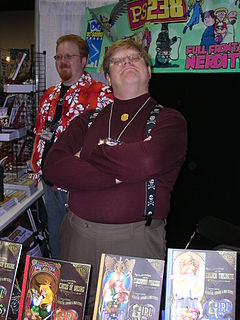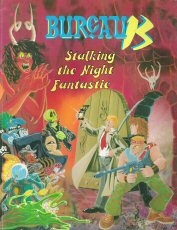This article has multiple issues. Please help improve it or discuss these issues on the talk page . (Learn how and when to remove these template messages)
|
Illegal Aliens is a science fiction comedy novel written by Nick Pollotta and Phil Foglio.
This article has multiple issues. Please help improve it or discuss these issues on the talk page . (Learn how and when to remove these template messages)
|
Illegal Aliens is a science fiction comedy novel written by Nick Pollotta and Phil Foglio.
The crew of the starship, All That Glitters, land on Earth to teasing its primitive natives, but the alien tricksters encounter a ruthless New York City street gang, the Bloody Deckers. A 'First Contact Team', who have been waiting years for aliens to land, now find the world in chaos and have to either rescue the aliens from the gang, or work with the gang to save Earth from the aliens. [1]
A perfectly spherical white spaceship lands in Central Park to great global excitement, from which Leader Idow, an alien covered in blue fur, claims that his crew represent a Type III civilization that will test Earth's worthiness to be a member planet of their federation. Unbeknownst to the United Nations, the aliens are criminals (the equivalent of juvenile delinquents) who seek out planets with levels of technology similar to Earth's so that they can record the global violence and mayhem that will result from Earth's certain failure for their own prurient interests.
The aliens scan the Central Park crowd for potential test subjects where they happen upon a minor New York gang who they identify as the most likely to provide the most entertainment during their "test".
Meanwhile, the United Nations has sent security into New York and identified two new aliens attempting to transport clandestinely to Earth. These aliens are representatives of the Gees, an extraterrestrial law-enforcement body whose mandates include preventing overt contact between space-travelling civilizations and non-space-travelling civilizations.
Unfortunately for the crew of the All That Glitters (a Mikon #4 class ship), the human gang manages to escape the test and infiltrate the ship, where they happen upon the ship's engineer Trell. Threatening Trell, the gang manages to release Omega Gas into the main bridge, killing Idow's crew (except Trell). The gang then holds the ship hostage, asking for pardons and appeasements. The army tricks the gang into accepting a group of beautiful women on board, who are actually army personnel sent to arrest them and take back the ship.
The United Nations' Alien Contact Crew manages to trick the Gees into believing that Trell has been dissected and liquefied for experimentation just before the Gees leave and set up a massive quarantine around Earth.
The human race, through Trell's assistance, has duplicated many of the Mikon #4's technologies, including molecular softening beams, advanced camouflage, horizontal/vertical elevators, and hyperdrive, with the intent to break the Gees' quarantine. They have also learned that the Gees are not the bosses of the galactic federation, merely a police force whose presence is resented by many planets, including some that have been quarantined specifically to prevent their entry into the federation.
Now loose in space, the illegal (human) alien crew of the Earth ship struggles to reach the Galactic League and argue a case for admittance - without getting blown out of existence by the Great Golden Ones (Galactic Police).
Illegal Aliens was first published in 1989 by TSR. It was Pollotta's first published work. [2] It was reprinted twice, in 2002 and 2008, [3] and has also been released in ebook form. [4]
The first edition contained chapter-heading illustrations by Phil Foglio, but those are missing from all other editions except the 2008 Scrybe Press edition.[ citation needed ]
The book was illegally translated into Russian in 1993 and released by the Soviet Union; the authors were never paid.[ citation needed ] An official Russian translation followed in 2007, released by AST Press of Moscow.[ citation needed ]
Pollotta and Foglio later wrote another novel together, publishing That Darn Squid God in 2004, though Foglio used the pseudonym "James Clay". [5]
Illegal Aliens was reviewed by well-known science fiction critic and author Tom Easton in the magazine Analog Science Fiction and Fact in 1989. [4]
The Fermi paradox is the conflict between the lack of clear, obvious evidence for extraterrestrial life and various high estimates for their existence. As a 2015 article put it, "If life is so easy, someone from somewhere must have come calling by now."

Philip Foglio is an American cartoonist and comic book artist known for his humorous science fiction and fantasy art.
Nick Pollotta was an American author. He is best known for his humorous novels, including the science-fiction novel, Illegal Aliens and the fantasy novels Bureau 13 and That Darn Squid God. The majority of his work was published by Gold Eagle Books under house names "James Axler" and "Don Pendleton."
The Uplift Universe is a fictional universe created by American science fiction writer David Brin. A central feature in this universe is the process of biological uplift.
The zoo hypothesis speculates on the assumed behavior and existence of technologically advanced extraterrestrial life and the reasons they refrain from contacting Earth. It is one of many theoretical explanations for the Fermi paradox. The hypothesis states that alien life intentionally avoids communication with Earth to allow for natural evolution and sociocultural development, and avoiding interplanetary contamination, similarly to people observing animals at a zoo. The hypothesis seeks to explain the apparent absence of extraterrestrial life despite its generally accepted plausibility and hence the reasonable expectation of its existence. A variant on the zoo hypothesis suggested by the former MIT Haystack Observatory scientist John Allen Ball, is the laboratory hypothesis, where humanity is being subjected to experiments, with Earth being a giant laboratory.

Bureau 13: Stalking the Night Fantastic is a satirical science fiction/horror tabletop role-playing game published by Tri Tac Games in 1992.

First contact is a common science fiction theme about the first meeting between humans and extraterrestrial life, or of any sentient species' first encounter with another one, given they are from different planets or natural satellites. The theme allows writers to explore such topics such as xenophobia, transcendentalism, and basic linguistics by adapting the anthropological topic of first contact to extraterrestrial cultures.

"The Heart of the Serpent" is a 1958 science fiction short story by the Soviet writer and paleontologist Ivan Yefremov.

Non-Stop is a 1958 science fiction novel by British writer Brian Aldiss. It is about problems that the inhabitants of a huge generation space ship face after an alien amino acid that they picked up on another planet triggers a pandemic. Law and order began to collapse, and knowledge of the ship and its purpose was eventually almost entirely lost throughout the vessel.
Aliens Stole My Body is a children's science fiction novel by Bruce Coville that was first published in 1998. This is the fourth book in a series about the fictional character Rod Albright. The illustrations and the front cover were done by the author's wife, Katherine Coville.

Across the Sea of Suns is a 1984 hard science fiction novel by American writer Gregory Benford. It is the second novel in his Galactic Center Saga, and continues to follow the scientist Nigel Walmsley, who encountered an extraterrestrial machine in the previous book, In the Ocean of Night, aboard an expeditionary spacecraft, searching for life. Eventually Nigel discovers evidence of the major conflict in the galaxy.
The planetary systems of stars other than the Sun and the Solar System are a staple element in many works of the science fiction genre.

"Founding Father" is a science fiction short story by American writer Isaac Asimov. It was first published in the October 1965 issue of Galaxy Science Fiction, and reprinted in the 1975 collection Buy Jupiter and Other Stories. It was inspired by a cover painting of a space-helmeted face backed by several crosses, provided by the magazine's editor, Frederik Pohl.

The Excalibur Alternative is a science fiction novel by American writer David Weber, published by Baen Books in 2002. It is one of several novels based on the premise of David Drake's 1986 novel Ranks of Bronze. This novel is based on the short story "Sir George and the Dragon", which appeared in the 2001 anthology Foreign Legions.
Illegal Alien or Illegal Aliens may refer to:

Enchantress from the Stars is a young adult science fiction novel by Sylvia Engdahl. It was her first or second book and is set in the Anthropology Service universe. Its sequel The Far Side of Evil (1971) features the same heroine, Elana, and the two are sometimes called the Elana series, although the sequel is quite different in tone.

Collision Course is a science fiction novel by American author Robert Silverberg, first published in hardcover in 1961 by Avalon Books and reprinted in paperback as an Ace Double later that year. Ace reissued it as a stand-alone volume in 1977 and 1982; a Tor paperback appeared in 1988. An Italian translation was also published in 1961, and a German translation later appeared. Silverberg planned the novel as a serial for Astounding Science Fiction, but John W. Campbell rejected the work and Silverberg eventually sold a shorter version to Amazing Stories, where it appeared in 1959.

Planet of Light is a science fiction novel by American writer Raymond F. Jones, first published in 1953 by the John C. Winston Co. as part of its 35-book set of juvenile novels. Written as a sequel to Son of the Stars, the story follows Ron Barron and his family as they are taken to a planet in the Great Galaxy of Andromeda to participate in a meeting of an intergalactic analogue of the United Nations. They face the question if Earth is ready to join an intergalactic society.

Star Rangers, also known as The Last Planet, is a science fiction novel by the American author Andre Norton. The novel was published on August 20, 1953, by Harcourt, Brace & Company. This is one of Norton's Central Control books, which lay out the history of a galactic empire through events suggested by Norton's understanding of Terran history.

The Orion Loop is a 1981 Soviet science fiction film directed by Vasily Levin.
{{cite web}}: CS1 maint: url-status (link)